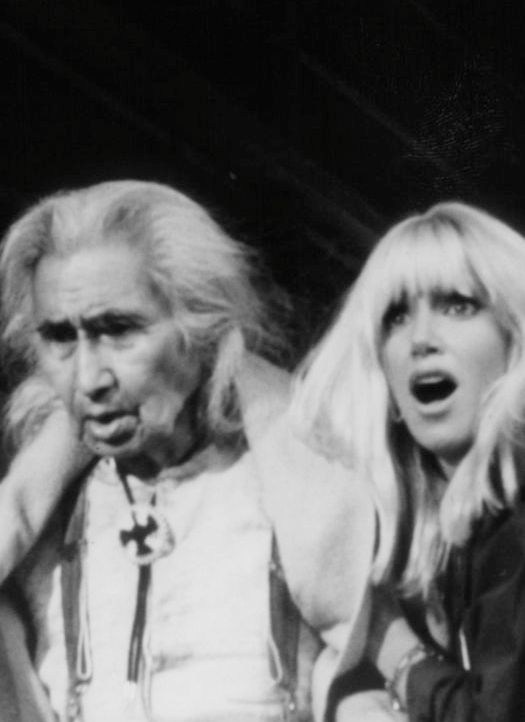Sunday, April 20, 1980
NOTHING PERSONAL. Written by Robert Kaufman. Music by Peter Mann. Directed by George Bloomfield. Running time: 96 minutes. Mature entertainment with the B.C. Classifier's warning: some suggestive scenes and coarse language.
IT'S NOTHING PERSONAL, BUT there are some things that just don't make it as entertainment anymore. Among them:
* Donald Sutherland playing yet another pot-smoking college professor.
* Suzanne Somers smiling her spacey, semi-sweet smile.
* Toronto's Yorkville village cleverly outfitted with blue U.S. Mail boxes so that it looks like any old American city.
* the profit-motivated villainy of an uncaring, though essentially inept, military-industrial complex.
* jerry-built socially-conscious comedy scripts with logical lapses large enough to drive TV commercial breaks through.
Watching Chief Dan George suffer the indignity of playing Manitoba's last surviving Indian in Nothing Personal reminded me of something New York critic Richard Corliss said in a recent issue of Film Comment, the magazine that he edits for the Film Society of Lincoln Centre.
"Take a look at the new (Canadian) films — the good (Silent Partner), the bad (City on Fire) and the indifferent (Murder by Decree) — and you'll swear that Canadian producers stepped en masse into a time-and-space machine and emerged on Hollywood and Vine in 1974. Heist movies, disaster movies, Sherlock Holmes movies — tired blood melodramas for a mass market that no longer exists.
"It's as if Mel Simon or Lew Grade ran a whole movie industry."
Nothing Personal recycles a tale of 1960s rebellion as if environmental activism were something new. Sadly, director George Bloomfield's disjointed romantic comedy is exactly the sort of film that Corliss is talking about.
File it among his "bad" Canadian features, and call it Nothing Original.
* * *
CANADIAN CONTENT: Vancouver theatre-goers will remember Quebec-born George Bloomfield as the director of playwright George Ryga's The Ecstacy of Rita Joe [1967], which featured the stage debut of Chief Dan George. An early alumnus of the CBC-TV drama department, Bloomfield was the man the corporation called back to take charge of itsexpensive, unimpressive telefilm Riel [1979].
It occurred to me, after after the press screening of Riel, that the Canadian director was in no danger of being seduced away to Hollywood. I'd forgotten that the 49-year-old filmmaker already had a couple of American features to his credit.
Jenny, released in 1970, featured Marlo Thomas and Alan Alda as a pair of confused lovers. Alda also starred (opposite Heath Lamberts) in Bloomfield's second U.S. feature, 1971's To Kill a Clown.
Returning to Canada and his native Montreal, he made Child Under a Leaf (1973) with Dyan Cannon. To date, I've yet to see a Bloomfield movie that I could like.
In the spirit of fairness, though, let me say that I almost always enjoy Global TV's satirical Second City show. Much to my surprise, George Bloomfield directs that, too.
The above is a restored version of a Province review by Michael Walsh originally published in 1980. For additional information on this archived material, please visit my FAQ.
Afterword: Could I have been more dismissive of Nothing Personal? Well, we were into the fifth year of Canada’s tax shelter era and Ontario’s filmmakers had given us much to dismiss. If I’d wanted to be really mean, though, I would have quoted from the picture’s promotional package that told us that screenwriter Robert Kaufman (a Los Angeles-based American) intended it to be “a tribute to the man he considers to be one of the greatest filmmakers of all time, Frank Capra.” (In an eerie coincidence, the two men died within days of one another in 1991: Capra on September 3 at age 94, Kaufman on November 21, aged 60.)
If I’d taken that approach to the film’s shortcomings, then a brief plot synopsis would have been necessary. Set in Washington D.C., Nothing Personal involves the efforts of activist academic Donald Sutherland and his idealistic attorney Suzanne Somers to “save the seals.” (Opposition to seal hunting became a public issue in the mid-1960s, and went international in the early 1980s.) They clash with corporate interests while falling in love. Indigenous wisdom is offered by Dan George as “Manitoba's last surviving Indian.” Additional Canadian content is provided by SCTV stars Catherine O’Hara, Eugene Levy and Joe Flaherty turning up in cameo roles. To attract U.S. ticket sales, American actors Somers, Roscoe Lee Browne and Dabney Coleman were top-billed. American audiences refused the bait, and the picture was both a critical and financial failure.
